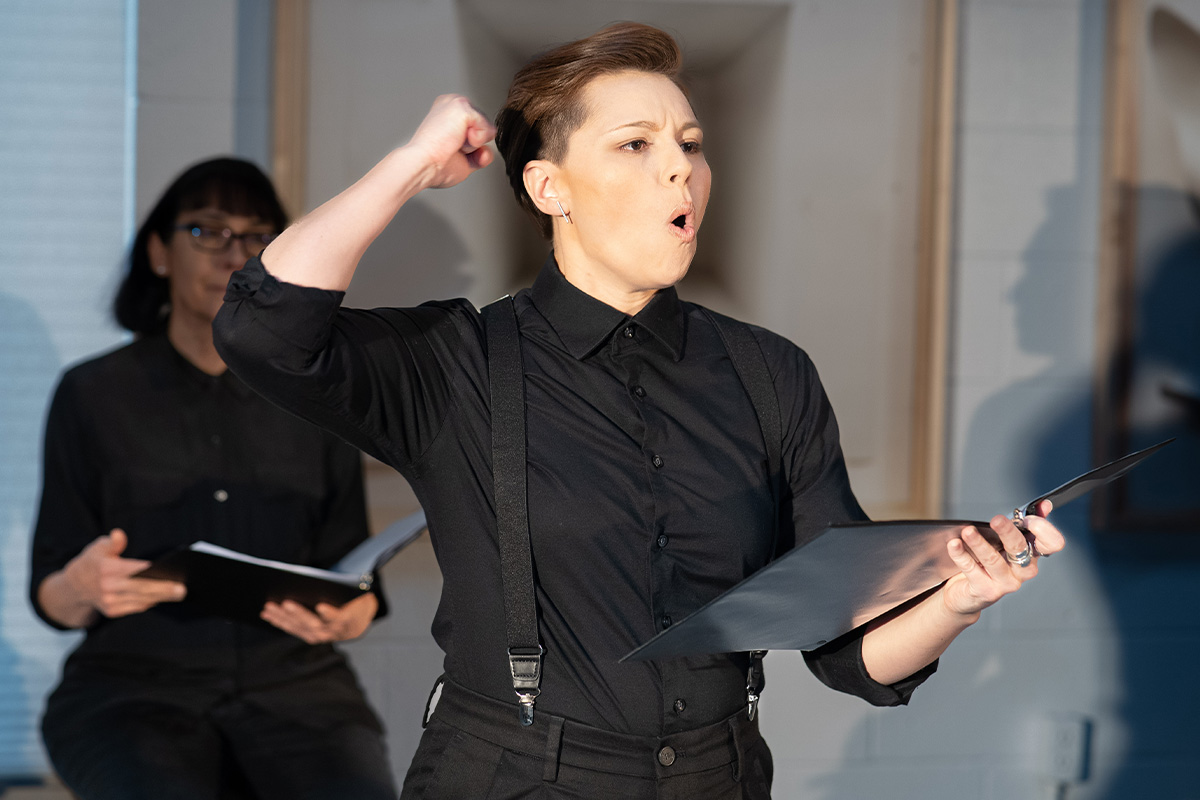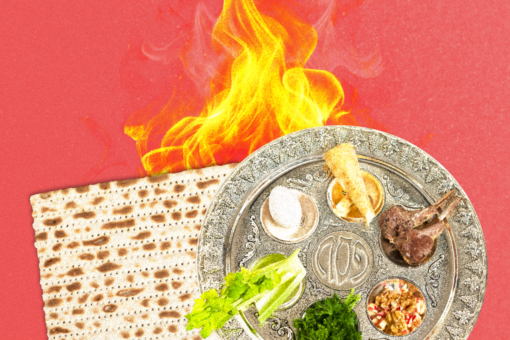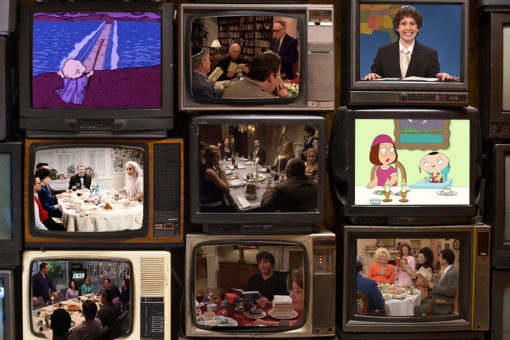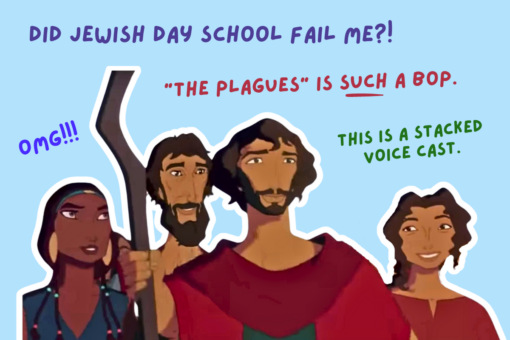In “Out Loud,” Jewish story company The Braid explores the Jewish queer experience through a series of scenes, monologues and songs. The audience is invited into the minds of various people — including a gay man reuniting with an old college flame and wondering if he’s more sexually fluid than he previously thought, a woman dating a trans man for the first time, the mom of a non-binary musician, a lesbian on a terrible date, a kid learning about gender fluidity via swim class and many more people in the queer community.
Though the stories center on queerness, Judaism is always present in some way: a mother’s delight over “a Jewish girl, no less,” a religious relative’s despair over a choice to discontinue life support, the low-down on a new relationship with a Jewish trans guy. At a time when the LGBTQIA+ and Jewish communities are under attack, “Out Loud” feels like a safe space to process and express joy, frustration, sadness and pride at the intersection of these two identities.
Opening night’s performance on March 12 was an intimate affair. The performance was held at a small art gallery in Torrance, California. Four actors stood before the seated audience, black binders aloft, ready to perform true stories from queer Jews and allies from across the decades.
“Out Loud” is a collection of stories woven together from various The Braid performances throughout the years, including a new piece written and performed by actor Vicki Juditz. In Juditz’s story, “House Sitting,” she talks about entering her kid’s apartment and doing what most Jewish mothers would do: cleaning the heck out of it and worrying.
During the monologue, the audience learns that Juditz’s child is nonbinary and is on tour with the singer Claud. In the piece, Juditz shares her concerns about her child’s safety traversing red states and glows with pride as she name-checks Claud songs, such as “Wish You Were Gay” and “That’s Mr. Bitch to You” (much to the delight of this major Claud fan).
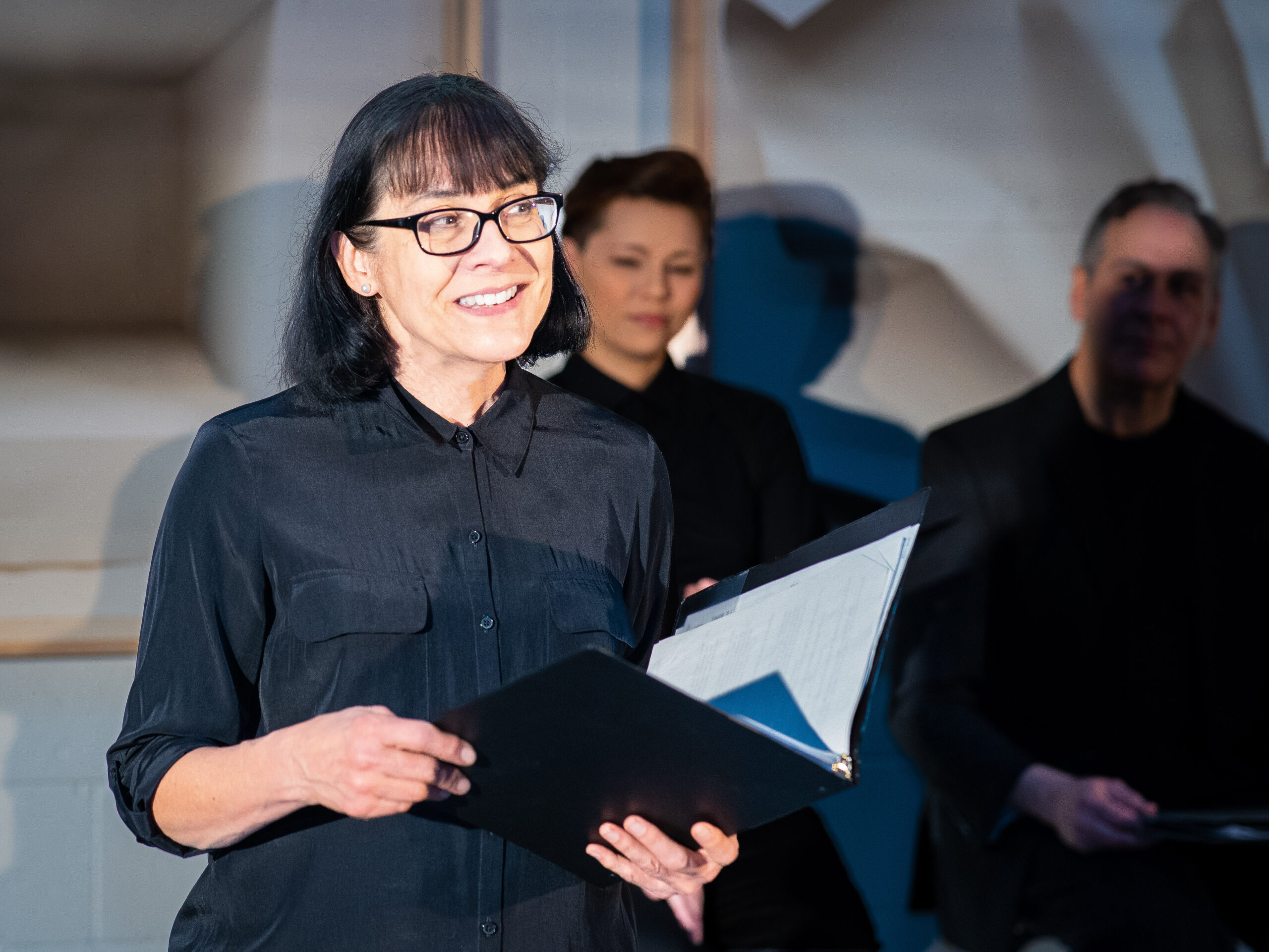
The Braid’s creative producer, Daphna Shull, called the production a “beautiful representation of the humanity and heart of the LGBTQIA+ community.”
“As a gay woman myself, I know the stigma and struggle many of us face to be ourselves in the world. The power of storytelling, and this show in particular, sheds light on the universality of experiences and empathetic connections we can make when we’re open to truly seeing each other,” Shull said.
The show is presented in partnership with JQ, the premiere LGBTQIA+ organization in Los Angeles; Beth Chayim Chadashim, which was founded in 1972 as the world’s first synagogue by and for gay and lesbian Jews; and Keshet, a national, grassroots organization that works for the full equality and inclusion of lesbian, gay, bisexual, and transgender Jews in Jewish life.
Actor Michael Gabiano told Hey Alma that “Out Loud” has something for everyone. “I’d dare to say there is something in every one of the stories that is relatable to all theatergoers, both inside the LGBTQIA+ community and out. Real, beautifully-told stories are universally compelling.”
He went on to say that “many in the cast have chimed in during rehearsals about how pieces in ‘Out Loud’ shine a light on how social identities — especially in the LGBTQIA+ community — can be misunderstood, not only by those outside the particular communities, but also by those inside them.”
This sentiment is echoed in one of the two monologues Gabiano delivers for “Out Loud.” In the scene “Donning the Mask,” Gabiano plays the partner of a cheating boyfriend obsessed with the dating app Grindr. Gabiano delivers the line, “Gay life, no matter how many advances there are for us, is inherently tough because gay men are not always kind to each other.”
“For me, the overall impact of working on and performing ‘Out Loud’ is the joy, laughter and, yes, tears that these pieces make me feel,” he said. “I never want to stop learning… about those who are not like me, and especially about myself and who I am.”
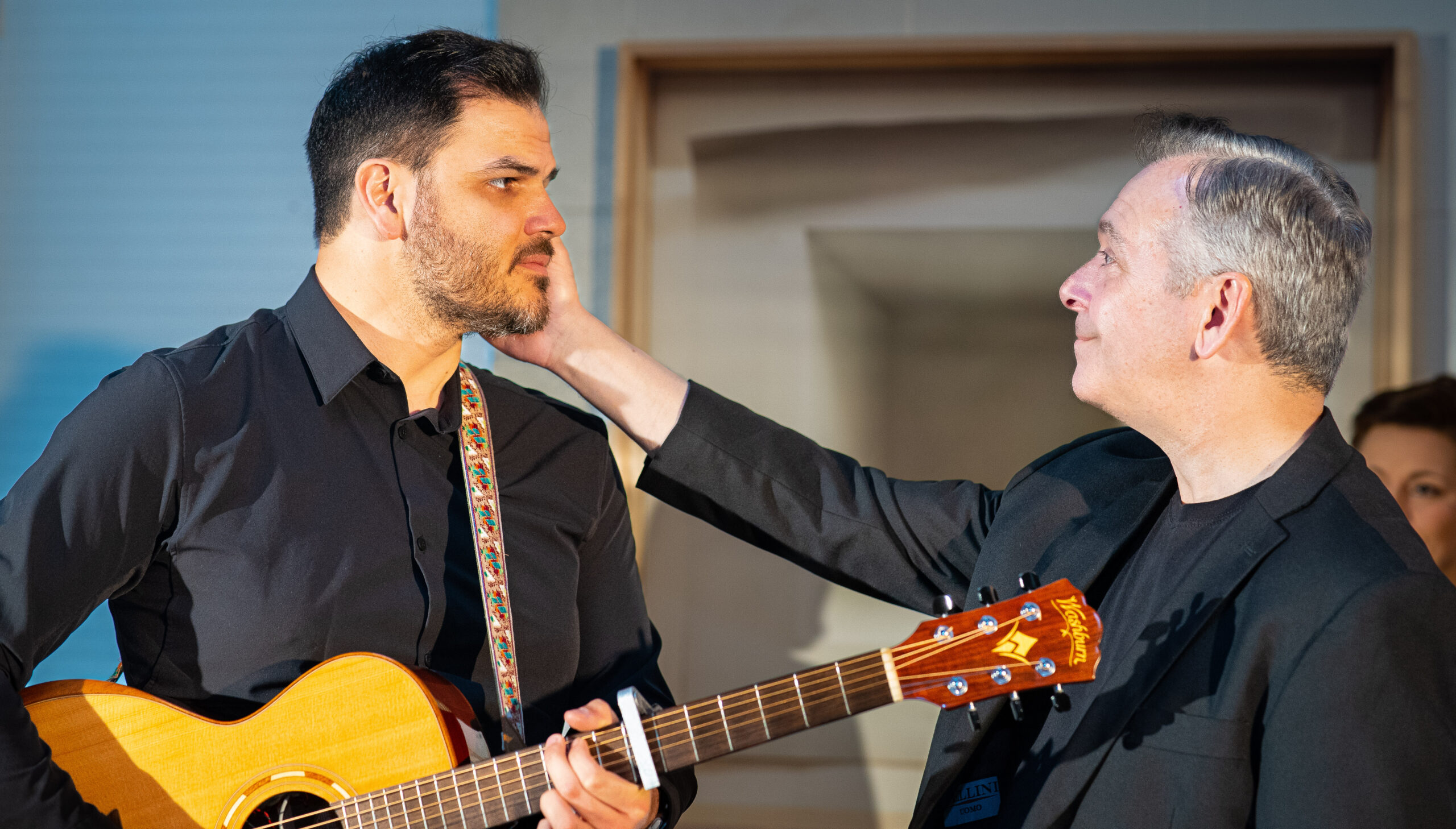
Another actor, Victoria Rani, shared that “the stories are so specific, I think it would be difficult for anyone with an open heart to walk away without connecting to something.” During the scene “Born and Born and Born and Born,” Rani gives a monologue about “reincarnating while alive” and feeling their queer identity grow from a whisper to a war cry. In “Finding My Truth,” they play a woman who is dating a trans man and questioning their own sexual identity.
“To me, the heart of ‘Born and Born and Born and Born’ is that we are not one thing — we contain multitudes if we allow ourselves to grow,” they said. “We have the chance in this life to live as who we are. The choice is up to us if we’re brave and lucky enough.”
“I identify as a ‘late bloomer,’ Rani explained. “Looking back, there were so many signs that I was queer and gender non-conforming. Even before I had the words, I knew I was bi/pansexual and genderfluid, but I was never fully out until a few years ago. I always had gay, lesbian and trans representation around me. Yet the attitude I picked up around bisexuality was that it was a phase. You either ‘get it out of your system’ or eventually admit you were actually gay. Bi erasure still exists and it’s part of what blocked me from coming out sooner. It’s healthy for everyone to question their sexuality and gender identity. But for me, believing my experience was a phase of ‘confusion’ I’d mature out of was harmful.”
“I have to remind myself that though it feels like I’m catching up, I’m right on time,” they explained. “I’ve accepted myself and my right to exist as who I am. I show up openly now as a direct result of the visibility of queer friends on social media. I’ll keep boosting that signal for others like me. Being part of this production has helped me continue to drain out that shame I held for so long.”
Rani continued, “we’re all just trying to keep our apartments clean, forgive each other, belong, pay our bills, forgive ourselves, get through traffic, find home, love, be loved and keep our friends and families safe. We’re the same. I want our audience to take that feeling home. But also…I’d love for you to feel inspired to buy a ticket to a drag show to keep the celebration going after this.”
At the time of publishing, multiple Republican-led state legislatures are trying to restrict or ban drags shows. In March, Tennessee became the first state to restrict drag performances. CNN reported that “Republicans say the performances expose children to sexual themes and imagery that are inappropriate.” Kentucky has also passed a bill limiting drag shows.
RuPaul has spoken out about the drag show bans and urged people to visit the ACLU Drag Defense Fund to learn more and show their support. “We know that bullies are incompetent at solving real issues. They look for easy targets so they can give the impression of being effective. They think our love, our light, our laughter and our joy are signs of weakness. But they’re wrong because that is our strength,” said the “RuPaul’s Drag Race” star.
The love, light, laughter and tears the “Out Loud” audience shares are what makes this show made up of true stories so powerful to watch. When asked what he wants the audience to take away from the performance, Gabiano answered, “when you are accepted (and loved) unconditionally for who you are, not only by others, but most importantly by yourself, you are never, ever alone.”
“Out Loud” is performing live in Southern California and on Zoom March 12 through April 2, in addition to a one-night-only performance on June 22 in New York.
